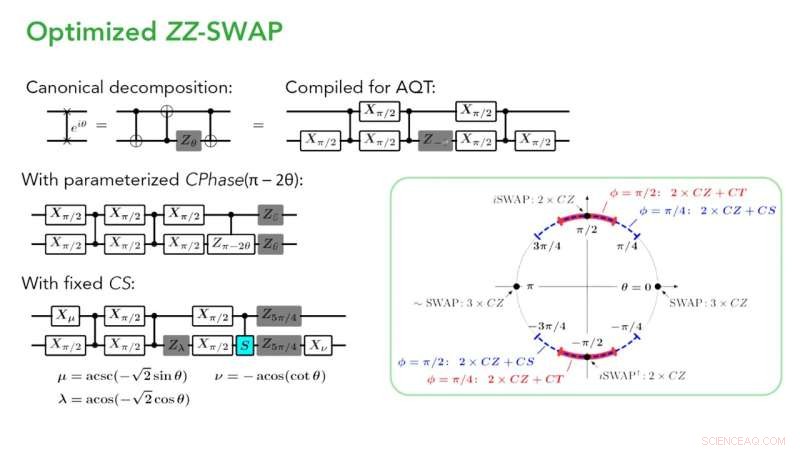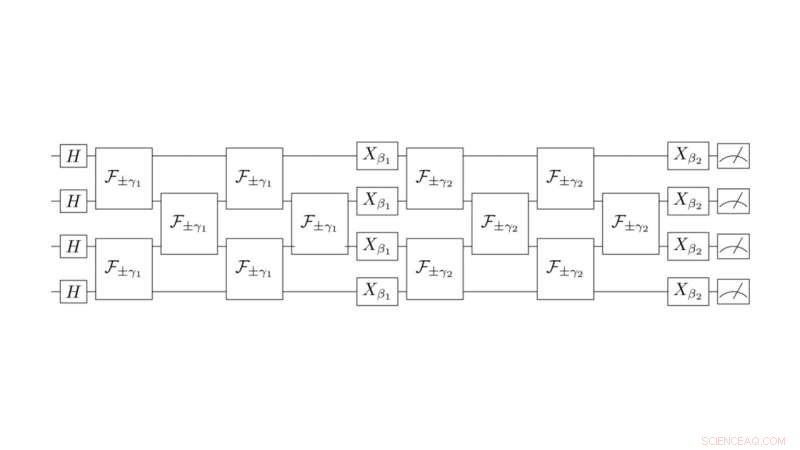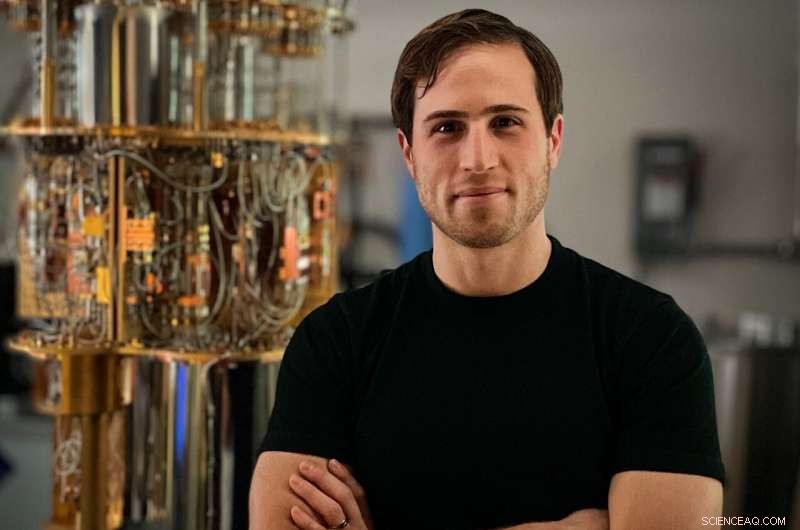
Esquema abrangente de redes SWAP otimizadas por software para portas AQT. Crédito:Rich Rines/Super.tech
Uma parceria de pesquisa no Advanced Quantum Testbed (AQT) do Lawrence Berkeley National Laboratory (Berkeley Lab) e Super.tech com sede em Chicago (adquirida pela ColdQuanta em maio de 2022) demonstrou como otimizar a execução do protocolo de rede ZZ SWAP, importante para Computação quântica. A equipe também introduziu uma nova técnica para mitigação de erros quânticos que melhorará a implementação do protocolo de rede em processadores quânticos. Os dados experimentais foram publicados em julho deste ano na
Physical Review Research , adicionando mais caminhos no curto prazo para implementar algoritmos quânticos usando computação quântica baseada em portas.
Um compilador inteligente para hardware quântico supercondutor Processadores quânticos com arquiteturas bi ou tridimensionais têm conectividade limitada de qubits, onde cada qubit interage com apenas um número limitado de outros qubits. Além disso, as informações de cada qubit só podem existir por algum tempo antes que ruídos e erros causem decoerência, limitando o tempo de execução e a fidelidade dos algoritmos quânticos. Portanto, ao projetar e executar um circuito quântico, os pesquisadores devem otimizar a tradução do circuito composto de portas abstratas (lógicas) para instruções físicas baseadas nas portas de hardware nativas disponíveis em um determinado processador quântico. Decomposições de circuito eficientes minimizam o tempo de operação porque consideram o número de portas e operações suportadas nativamente pelo hardware para realizar as operações lógicas desejadas.
As portas SWAP – que trocam informações entre qubits – são frequentemente introduzidas em circuitos quânticos para facilitar interações entre informações em qubits não adjacentes. Se um dispositivo quântico permite apenas portas entre qubits adjacentes, as trocas são usadas para mover informações de um qubit para outro qubit não adjacente.
Em hardware ruidoso de quantum de escala intermediária (NISQ), a introdução de portas de troca pode exigir uma grande sobrecarga experimental. A porta de troca geralmente deve ser decomposta em portas nativas, como portas não controladas. Portanto, ao projetar circuitos quânticos com conectividade qubit limitada, é importante usar um compilador inteligente que possa pesquisar, decompor e cancelar portas quânticas redundantes para melhorar o tempo de execução de um algoritmo ou aplicativo quântico.

Esquema de redes SWAP para QAOA em quatro qubits. Crédito:Akel Hashim/Berkeley Lab
A parceria de pesquisa usou o software SuperstaQ da Super.tech, permitindo que os cientistas adaptassem suas aplicações e automatizassem as compilações de circuitos para o hardware supercondutor da AQT, particularmente para um portão S controlado de alta fidelidade nativo, que não está disponível na maioria dos sistemas de hardware. Essa abordagem de compilação inteligente com quatro qubits transmon permite que as redes SWAP sejam decompostas com mais eficiência do que os métodos de decomposição padrão.
Uma rede de portas ZZ SWAP requer apenas conectividade linear mínima entre qubits sem acoplamentos adicionais, por isso oferece vantagens práticas para a execução eficiente de algoritmos quânticos, como o Algoritmo de Otimização Aproximada Quântica (QAOA). QAOA approximates solutions to combinatorial optimization problems—finding the optimal answer by giving a set of criteria. The Maximum-Cut problem, which can be used to arrange hubs on a transport grid system, is an example of a famous combinatorial optimization problem that can be potentially solved faster with QAOA using quantum circuits.
"One of the toughest challenges in quantum computing is to perform discrete logic operations. Because our control signals are analog and continuous, they're always imperfect. As we build more complex quantum circuits, the software infrastructure that optimally compiles gates tailored for AQT's hardware helps us achieve higher operational fidelity," Akel Hashim, the lead AQT researcher on the experiment and a graduate student at the University of California, Berkeley.
"A unique feature of quantum computing is that it enables partial logic gates. This feature has no parallel in traditional boolean logic—for example, your laptop computer can't execute 50% of an AND gate. AQT's ability to calibrate these partial controlled-S quantum gates opened the door for us to develop a wider array of novel optimizations to squeeze the most out of the hardware," said Rich Rines, formerly of Super.tech and currently a software engineer at ColdQuanta.
"A key software engineering challenge for this experiment was collaborating remotely, so we iteratively developed quantum circuit optimizations informed by the custom gates AQT's team calibrated. We optimized end-to-end by figuring out how to serialize these pulses while considering the hardware. We also figured out how to integrate open-source quantum software packages with our compiler, ensuring that our optimizations don't re-invent the wheel," said Victory Omole, formerly at Super.tech and software engineer at ColdQuanta.

Akel Hashim, lead AQT researcher on the experiment. Credit:Akel Hashim/Berkeley Lab
As part of the experiment, the team also introduced a novel technique called Equivalent Circuit Averaging (ECA), which randomized the various parameters of the SWAP networks to generate many logically equivalent circuits. ECA randomizes the decomposition of quantum circuits, mitigating the impact of systematic coherent errors—one of the most severe errors in quantum computers and error mitigation at AQT.
"I proposed a way to merge my previous experimental work in randomized compiling with Quantum Benchmark (acquired by Keysight) using Super.tech's smart compiler to study a new way to reduce the impact of crosstalk errors," said Hashim. "I would not have had the insight to come up with this idea had I not worked with other researchers as part of AQT's user program. As someone who's going to enter the workforce, networking is critical to building a core base of people I know in the field who are experts in various areas, to whom I can pitch research ideas as well."
These experimental optimizations resulted in an improvement of up to 88% in the performance accuracy of QAOA. Researchers are looking to continue to explore and refine the methods in this work and apply them to other applications.
Supporting industry growth with an open-access research lab AQT operates a state-of-the-art open experimental testbed based on superconducting circuits and is funded by the United States Department of Energy Office of Science Advanced Scientific Computing Research (ASCR) program. Technologies developed elsewhere can be deployed and field-tested at AQT, providing deep access to the full quantum computing stack at no additional cost.
Since the inauguration of its user program in 2020, AQT provided Super.tech, one of several industry users, with low-level access to the hardware to test their ideas. Few cloud-based quantum platforms offer this type of full access to the entire quantum computing stack and real-time feedback from the hardware experts at no cost. Super.tech collaborated with AQT's expert experimental team to learn ways to improve performance on this type of hardware.
"By revealing the inner controls of quantum hardware, AQT's collaborative approach with users drives innovation throughout the quantum computing stack. We look forward to continuing our research collaboration with AQT, and we will continue to share these results with the scientific community by publishing our learnings," said Pranav Gokhale, VP of Quantum Software at ColdQuanta and Super.tech former CEO and co-founder.
AQT at Berkeley Lab continues to grow as a cutting-edge hub for quantum information research and development by bringing together expertise and users, including early-stage startups, such as Super.tech, who now continue in their growth journey as part of ColdQuanta.
+ Explorar mais Breakthrough in quantum universal gate sets:A high-fidelity iToffoli gate


